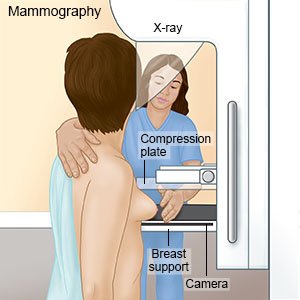Nipple Discharge
Medically reviewed by Drugs.com. Last updated on May 6, 2024.
What do I need to know about nipple discharge?
Nipple discharge is fluid from one or both nipples. Fluid may come out on its own or when you touch your breast or nipple. The fluid may be white, yellow, green, pink, watery, or bloody. Nipple discharge is normal in a woman that is pregnant or breastfeeding. A woman should contact her healthcare provider if she has nipple discharge when she is not pregnant or breastfeeding. A man should always contact his healthcare provider if he has nipple discharge.
What signs and symptoms may happen with nipple discharge?
- Fever or body aches
- Breast pain or discomfort
- A swollen breast or nipple
- A change in breast shape
- A change in nipple shape or color
- Swollen lymph nodes under your arms
What causes nipple discharge?
- A growth or abnormal cells in the milk ducts
- Too much of the hormone that causes your breasts to make milk
- Breast cancer
- Infection or injury to the chest
- Touching the breast or nipple during sex
- Rubbing of clothing against the nipple during vigorous exercise
- Certain medicines such as oral contraceptives, antidepressants, or blood pressure medicines
How is nipple discharge diagnosed?
Tell your healthcare provider about your symptoms. He or she may feel your breast for lumps or swelling. Tell him or her about any medicines that you take. You may need any of the following tests to find the cause of your nipple discharge:
- Blood tests may be done to check your hormone levels or for infection or pregnancy.
- Mammogram, ultrasound, or MRI pictures may show a tumor or infection in your breast.

- A ductoscopy uses a scope to look inside your milk ducts for tumors or infection.
- A breast biopsy may be done to test for cancer or infection. Breast tissue is removed and sent to the lab for tests.
How is nipple discharge treated?
Treatment will depend on the cause of your nipple discharge. Medicines that cause nipple discharge may be stopped or changed. Medicines may be given to control your hormone levels, decrease pain, or treat an infection. Avoid touching your nipples or breast. This may stop or decrease discharge from your nipples. Wear a tight fitting bra during exercise to decrease rubbing on your nipples.
When should I contact my healthcare provider?
- You have a fever.
- You have more breast discharge or it changes color.
- You have new or worsening breast pain.
- You have questions or concerns about your condition or care.
Care Agreement
You have the right to help plan your care. Learn about your health condition and how it may be treated. Discuss treatment options with your healthcare providers to decide what care you want to receive. You always have the right to refuse treatment. The above information is an educational aid only. It is not intended as medical advice for individual conditions or treatments. Talk to your doctor, nurse or pharmacist before following any medical regimen to see if it is safe and effective for you.© Copyright Merative 2024 Information is for End User's use only and may not be sold, redistributed or otherwise used for commercial purposes.
Further information
Always consult your healthcare provider to ensure the information displayed on this page applies to your personal circumstances.
